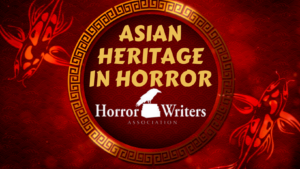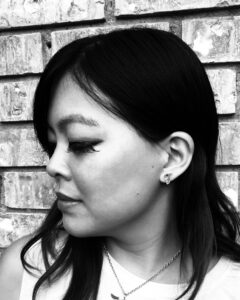Asian Heritage in Horror: Interview with Kelsea Yu

 Kelsea Yu is a Taiwanese Chinese American writer who is eternally enthusiastic about sharks and appreciates a good ghost story. Her short stories and essays appear in magazines such as Fantasy, PseudoPod, and Reckoning, and in various anthologies. Her novella Bound Feet is published with Cemetery Gates Media, and her debut novel It’s Only a Game is forthcoming from Bloomsbury Children’s in 2024. Kelsea lives with her husband, children, and a pile of art supplies in the Pacific Northwest. Find her on Instagram and Twitter as @anovelescape or visit her website kelseayu.com.
Kelsea Yu is a Taiwanese Chinese American writer who is eternally enthusiastic about sharks and appreciates a good ghost story. Her short stories and essays appear in magazines such as Fantasy, PseudoPod, and Reckoning, and in various anthologies. Her novella Bound Feet is published with Cemetery Gates Media, and her debut novel It’s Only a Game is forthcoming from Bloomsbury Children’s in 2024. Kelsea lives with her husband, children, and a pile of art supplies in the Pacific Northwest. Find her on Instagram and Twitter as @anovelescape or visit her website kelseayu.com.
What inspired you to start writing?
I fell in love with storytelling early in life. When I was ten, I recruited my younger brother to help me co-write Underwater Wars, a Star Wars knockoff where the characters were marine animals battling each other (you guessed it) underwater. We (term used loosely—I think I ended up writing all of it…my brother was, after all, eight) got to something like 50 handwritten pages and elaborate plans for a corresponding trading card game before we abandoned that project.
Eighteen years later, I joined National Novel Writing Month (NaNoWriMo) on a whim, which led me to another attempted novel. Alas, that book was also to be abandoned. But it got me back into writing fiction, something I hadn’t done much of since high school. I started working toward getting published (somewhere along the way, I learned to finish novels, thankfully), which led me to think more about the kind of stories I wanted to tell. And while this wasn’t my original reason for writing, what kept me going through many long years on the path to publication was the desire for more Chinese American representation in the English language market.
What was it about the horror genre that drew you to it?
I read pretty widely across genres, so I had read the occasional horror book over the years, but I didn’t fall in love with the genre as a whole until early 2021. It was a difficult time in my life (pandemic + pregnancy loss), and after bottling up my grief for two months, it poured out of me in the form of a short horror story, “Creature,” which will be published in Kaleidotrope in 2024. I discovered what horror readers and writers everywhere have long known—the genre is incredibly cathartic.
After finishing “Creature,” I asked horror-loving friends for recommendations and started reading. And then I started writing more. After two years filled with many nights spent reading or writing horror well into the dark hours, I’m now fully obsessed.
(For a fuller answer to this question, see the afterword to my novella Bound Feet.)
Do you make a conscious effort to include Asian and/or Pacific Islander characters and themes in your writing and if so, what do you want to portray?
Yes! Most of my main characters are Chinese American (like me). And my pieces often explore elements of Chinese American identity, Chinese American history (so often untold—sometimes by accident and other times by design), or Chinese mythology and folklore. I also write stories that include none of the above. I write about what inspires me in the moment.
Though one thing I rarely skip in a story, no matter its central theme, is the chance to include Chinese food. (Perils of writing while hungry!)
What has writing horror taught you about the world and yourself?
Writing horror taught me to be brave. It’s hard to write effective, emotional horror without opening yourself up—picking at those scabs and scars. It pushes me to face my fears and process my traumas while simultaneously giving my brain (which tends to run wild with anxiety) something (the story) to stay focused on.
How have you seen the horror genre change over the years? And how do you think it will continue to evolve?
My answer from a previous interview (https://horror.org/women-in-horror-interview-with-kelsea-yu) still applies here, but I’ll reiterate something I want to emphasize: Chinese people make up a sizable portion of the world’s population, and plenty of us live in English-speaking countries. We also have lots of horror inspiration in our folklore and history. And yet, it is near impossible to find Chinese diaspora-authored horror novels in the English language.
My hope is for this to shift. I’m excited about recently released and upcoming Chinese diaspora-authored horror novellas (I’ll recommend some below). As often is the case, indie horror is ahead of the game here. I’d love to see that shift happen at traditional imprints as well.
And this is more a hope than a prediction: please let gothic continue to grow (and remain popular!) as a horror subgenre. As evidence of my ardent desire for this: I have an essay coming up in Psychopomp titled “The Gateway Back to Gothic,” in which I talk about falling back in love with gothic and recommend BIPOC-authored gothic horror books.
How do you feel the Asian and/or Pacific Islander communities have been represented thus far in the genre and what hopes do you have for representation in the genre going forward?
As you can probably tell from my answer to the previous question, I think we’re still severely underrepresented. And considering that it’s hard to find even Chinese diaspora-authored horror novels (given how Chinese populations compare with other API groups), imagine how starved readers are for books by authors with other API identities and intersections. I see this changing to some degree, but there’s still a long road ahead.
I’d love for editors and publishers, no matter the size of their imprint, to take a hard, honest look at who they’re publishing. I hope for more and a wider variety of API representation across multiple subgenres within horror.
Who are some of your favorite Asian and/or Pacific Islander characters in horror?
I’m going to cheat and point you to the next question because I loved so many of the characters from those books. I’ll also add the bride ghost in Cassandra Khaw’s Nothing But Blackened Teeth, the storyteller from Frances Lu-Pai Ippolito’s “Noblesse Oblige,” Anamaria Marquez from Isabel Yap’s “Have You Heard the One About Anamaria Marquez?,” and the hustlin’ family in the movie Parasite.
Who are some Asian and/or Pacific Islander horror authors you recommend our audience check out?
So many! I’ll limit myself to API authors whose books I read this year, otherwise, we’ll be here all day. First, a few novellas (I’m on a novella kick). Ashley Deng’s Dehiscent (out later this year) was one of my most anticipated reads of the year and still managed to surpass my expectations. J.A.W. McCarthy’s Sleep Alone is a wonderful gut punch of a novella that culminates in an absolutely heart-wrenching finale. Ai Jiang’s Linghun tackles grief and so much more—and it will forever haunt me. And Cassandra Khaw’s The Salt Grows Heavy was visceral, sharp-toothed, and chilling in a way I won’t forget.
And a few novels! Catherine Yu’s Direwood was deliciously creepy and ensured I will never look at caterpillars the same way again. Trang Thanh Tran’s She is a Haunting managed to be fast-paced, complex, creepy, atmospheric, and emotional all at once. Jade Song’s Chlorine was a wild, bloody ride that held nothing back. Cassie Hart’s Butcherbird had me wholly absorbed from start to finish—I highly recommend the audiobook. I’m reading Yangsze Choo’s The Ghost Bride now and loving everything about it. And both the editors (Lee Murray and Angela Yuriko Smith) as well as all the authors of the beautiful, deeply personal, and thought-provoking Unquiet Spirits collection are doing very cool things in horror.
What is one piece of advice you would give horror authors today?
When I’m writing horror, I personally find ‘scary’ too subjective a measure to aim for—especially since it’s largely dependent on the individual reader and their reading conditions (weather, time of day, location, being physically alone, etc.). Obviously, those factors are outside the writer’s control. Instead, I try for creepy or unsettling which, while still imperfect, is somewhat more reliable.
And to the Asian and/or Pacific Islander writers out there who are just getting started, what advice would you give them?
When I first started writing horror, it took a long time for me to find other API horror writers. But when I did find them, I was welcomed with open arms. I promise we’re out here, even if it’s taking a while for us to gain visibility. We’re writing our stories and there’s space for all of us, in part due to the hard work of API folk who are making that space for our stories by starting new publishing houses, editing for magazines and anthologies, etc. (Some people in publishing try to pit writers who share a marginalized identity against one another—don’t fall for it.) And many, many of us would be more than happy to talk to and/or help out fellow API writers. In fact, open invitation to message or email me if you want to chat!



